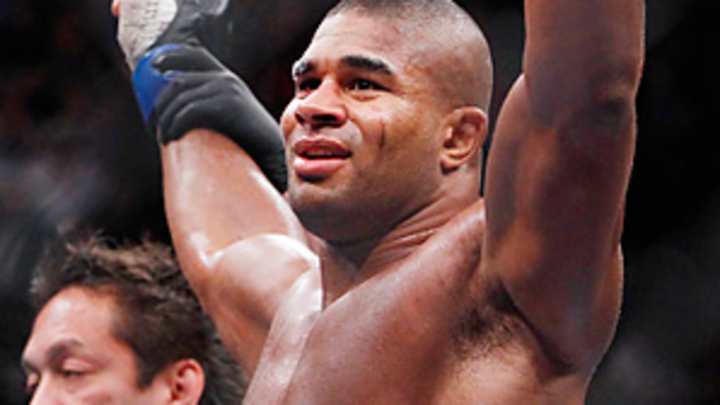Overeem's testosterone story fails to stop Nevada license rejection

During more than two hours of testimony, Overeem and his attorney shared a detailed story explaining why the Dutch fighter's urinalysis had come back with elevated testosterone levels more than twice the acceptable range after a random drug test in late March.
Their tale had a star witness -- Dr. Hector Oscar Molina of Irving, Texas -- who said he'd injected Overeem on Jan. 12 with a self-mixed, anti-inflammatory concoction that, unknown to the fighter, contained testosterone.
It also had sacrifice, said Overeem and his attorney, David Chesnoff, as they both told the commission that the fighter had voluntarily withdrawn from a title shot against heavyweight champion Junior dos Santos at UFC 146 on May 26 to sort the issue out.
"My position became not credible. The media reports," Overeem said. "So, I was willing to step back and believe me when I tell you the title fight is my dream. That's my ultimate goal."
Still, the four presiding commissioners voted unanimously to deny Overeem his license but reduced the standard reapplication wait period from one year to nine months with the caveat that Overeem not fight anywhere else during that time.
"With steroids, [the commission] usually goes nine months," NSAC Executive Director Keith Kizer said of the three-month reduction. "They were trying to be equitable and fair. This was the very first random drug test hearing."
The random drug test, scheduled to take place right after a UFC news conference on March 27 in Las Vegas, became a key area of interest after Kizer said he'd witnessed the 6-foot-5, 260-pound Overeem exiting the MGM Grand Hotel and Casino without having given his urine specimen.
"As soon as the conference was over, Mr. Overeem speeded out of the building, jumped into a car and took off," Kizer told the commission.
Kizer contacted Kirk Hendrick, UFC owner Zuffa's chief operating officer, to let him know a missed test would be treated as a failed one. Overeem returned about 15 minutes later and was escorted with two other fighters by Kizer to a fourth-floor hotel room to deposit his sample.
At the hearing, Overeem explained that he hadn't heard of the test until after he'd left the building.
"I did not get to Mr. Overeem directly," UFC employee Greg Hendrick told the commission. "I got to the camps, who were with him at the time. I told them that they could not leave until after the process was taken care of."
However, Molina, the physician who treated Overeem in January, provided the most disconcerting details of the fighter's story.
Molina had evaluated Overeem seven months earlier under the Texas Dept. of Licensing and Regulation's hire for a bout in Strikeforce and met with him again at his private office on Jan. 12 during Overeem's promotional tour primarily for a re-aggravated rib injury.
Molina told the commissioners he injected Overeem with a drug cocktail that contained "a combination of Vitamin B-12, Dexamethosone, Toradol and an aqueous form of testosterone."
He then handed the fighter an additional vial of the concoction, his contact information missing from the label, and two needles with the instructions to take as needed.
On March 23, four days before the random tests, Overeem said he injected himself with the medication again in Las Vegas under Molina's direction.
"That's what I think caused the [testosterone] spike, but the amount he was given shouldn't have been enough to enhance his performance," Molina told the commission.
Through lengthy questioning, it was established that Overeem hadn't asked what was in Dr. Molina's "tetramix," but the physician hadn't told the fighter it had testosterone in it. When asked why he'd included testosterone, Molina said that it acted as a catalyst for the other three ingredients.
The physician, whose Molina Medical Center offers services from general medicine to plastic surgery, told the commission that he used his "tetramix" on other professional athletes.
"[But] not everybody," he added. "Just for those who need it."
After they scrutinized Molina's paperwork documenting the January visit, deliberation came easy enough for the commission.
On Tuesday evening, Kizer said he'd already received some critical feedback about the commission's decision to shorten Overeem's waiting period by three months, as well as complaints that the commission had been too gentle with Overeem.
"Sometimes they want you to berate and scream at the athlete," Kizer said. "That's not the style of this commission. They don't need to flex their muscle to show their strength."
Though he can reapply for licensure after Dec. 27, Overeem won't appear in the Octagon until early 2013. Zuffa has made no indication that it would terminate Overeem's multi-fight, seven-figure contract (which includes a $1,000,000 bonus over his first three fights). The promotion doesn't discuss its fighter contracts publicly, but renegotiations seem inevitable.
"This was going to be the crown of my career, which I'm giving up to take a couple steps back, to get back on the horse, do all the testing, [and] prove [it] myself that I'm a clean fighter," Overeem told the commission.
In nine months, Overeem, the former No. 1 heavyweight contender, will be back before the commission again. Kizer has some advice.
"The burden will be on Overeem in nine months to show what he's done," Kizer said. "It might be wise for the UFC to consider their own testing [in this case], to have additional information ready, but that's really between them."
